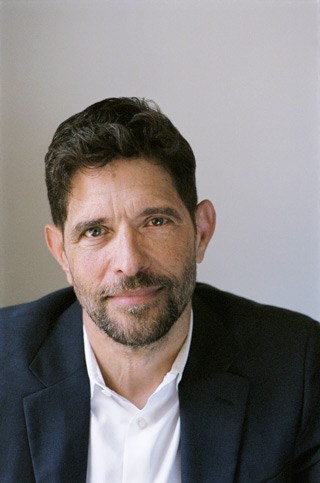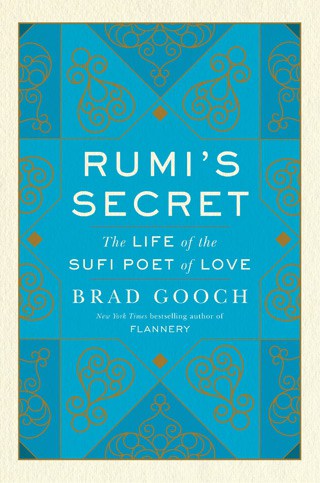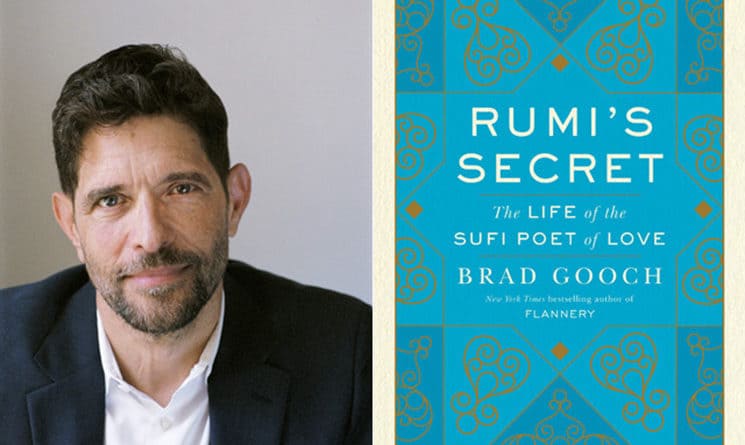Before Rumi, the 13th-century Persian poet and Sufi mystic, became one of the world’s most popular poets and an interfaith icon, he was Jalal ad-Din Muhammad Rumi, a Muslim scholar and cleric, just like his father before him. He had disciples, a family, and a quiet life.
Then, in the 1240s, the eccentric mystic Shams of Tabriz appeared in Rumi’s life, and the poet we know today was born. In “Rumi’s Secret,” biographer Brad Gooch traces the path of Rumi’s life and argues that his brief but intense relationship with Shams radically altered the poet and inspired him to write about, advocate for, and, ultimately, live a religion of love.
“Rumi writes about it often. Many of his poems are about this idea: ‘Love stole my prayer beads and gave me poetry and songs.’ All this is the effect of Shams of Tabriz,” says Gooch.
He’ll read from “Rumi’s Secret” and talk about the Sufi poet’s life on Thursday, Feb. 2, at 7 p.m. at The Music Hall Loft in Portsmouth.
Gooch, whose previous books include acclaimed biographies of writers Frank O’Hara and Flannery O’Connor, spent roughly a decade immersed in Rumi’s life and work. He learned Persian so that he could translate Rumi’s poems and retraced his steps. Gooch even found himself in Aleppo on the eve of the Syrian civil war.
Rumi’s poetry is full of small puzzles, secrets waiting to spring on unsuspecting readers and shake them loose from quotidian concerns. For Gooch, Rumi’s life, and his relationship with Shams, presented a similar mystery, and “Rumi’s Secret” delves into these puzzles while also placing the poet in the context of Middle Eastern history.
The Sound recently spoke with Gooch by phone about what Rumi has in common with O’Hara and O’Connor, what it takes to research a story both geographically and historically distant, and why Rumi’s poetry and ideas have endured for eight centuries.

Brad Gooch photo by Dominique Nabokov
Can you talk about how you first discovered Rumi, and what set you on the path to writing this biography?
I first came across his poetry and was kind of entranced and seduced, like many people are. It was in the early 1990s and I was staying with friends in Miami, and on their bookshelf were two collections of Rumi’s poems translated by the Cambridge don A.J. Arberry. These are scholarly, literal translations, but they were beautiful and mysterious to me and stayed with me. Then, in the mid-1990s at Christmas, I got the same gift from three different people, “The Essential Rumi” by Coleman Barks.
I was also writing a book, “Godtalk,” which was published in 2002, and the last chapter in the book was about Muslims in New York City. And for that, I became part of and reported on a Sufi group that met Friday evenings on the Upper West Side. There, the leader of the group would read not from Rumi’s poetry, but from his talks that had been written down, and the emphasis was on him more as a religious teacher and his Muslim background. The group was mainly young Muslim Americans in their 20s and 30s, and as I learned more about the geography and the culture of that part of the world and of Rumi’s life, I wanted to find a way to connect these lines that were floating around. As a writer, I could tell it was a great story.
So you’ve had the idea for the book for a while. What made this the right time for “Rumi’s Secret”?
It’s been percolating. I did bring this idea up at the time “Godtalk” was published in 2002. It was right after 9/11, and when I mentioned to publishers this idea of an interested and sympathetic biography of a Muslim poet, they sort of looked pale and confused (laughs). So I didn’t get the sense it was going to be possible, really. So I wrote (“Flannery: A Life of Flannery O’Connor”) … and when I returned to the idea six years later and mentioned it to publishers, it couldn’t have been more different. Suddenly everyone was very interested. … I think it’s the tragedy of American involvement in that part of the world. Now, terms like Sunni and Shia don’t sound so impossible. We know where Iraq and Afghanistan and Syria are. (“Rumi’s Secret”) almost became a way to talk about all the issues we’re interested in and concerned with in this convex mirror of a story that took place eight centuries ago. So off I went.
And what did that entail?
(laughs.) The “off I went” turned out to be more labor-intensive than I had perhaps thought through. I needed to learn Farsi … and I did an immersion language programs for two summers at the University of Texas at Austin and the University of Madison. … There was the language part, and then the travel. The map of Rumi’s life extends over 2,500 miles. … I needed to see things, even though they were historically distant. And all this meant traveling through parts of the world that have a certain amount of geopolitical tension. … It started out as a kind of mystical world of whirling dervishes and … I actually wound up being detained in Tajikistan, where someone took my camera and tried to bring me to the Ministry of Justice, and I was in Aleppo the day the Syrian civil war broke out in 2011.
You write about how Rumi’s life shifted drastically after meeting Shams of Tabriz. Can you talk about why the relationship between them was so transformative for Rumi?
One of the things that interested me in the story of Rumi’s life was this mid-life transformation. It’s in contrast to Frank O’Hara, who came to New York in his early 20s and became the quintessential New York poet, or Flannery O’Connor, who at the age of 25 was forced back home … after she was diagnosed with lupus. Rumi was in his late 30s and was a respected teacher, preacher, and jurist. And then he meets Shams of Tabriz, this outlier mystic … and they had this electric response to each other. And they go into seclusion together, much to the upset of Rumi’s family and his whole community of disciples.
And there, it seems Shams is trying to shift Rumi from the path of knowledge … to the path of love and the heart, and also toward his creative side. … Rumi writes about it often. Many of his poems are about this idea: “Love stole my prayer beads and gave me poetry and songs.” All this is the effect of Shams of Tabriz.
At the same time, it’s a really unusual relationship … and therefore seems very modern to us. Neither of them could quite figure out how to define that relationship. The usual mode in that culture, which was a pretty traditional culture, was a sheikh and a disciple, someone older and someone younger. In this case, Shams was in many ways Rumi’s teacher, but Rumi was already an established religious leader at this time. … Someone said (about their relationship), “You can’t tell who’s the lover and who’s the beloved.” All this was shocking and energetic and lively and interesting and caused this transformation in Rumi.

What is it about Rumi’s poetry and teachings that you think has made it reach across so many religious traditions and endure for so many centuries?
There’s a kind of, even though Rumi doesn’t write about the details of his daily life, honesty and transparency, almost like Walt Whitman, between Rumi and his reader or listener. Also, in trying to work through his separation from Shams of Tabriz and reconcile this with his devotion to God, he developed a kind of poetry. He used the ghazal, which were the mode of love poems in Persia, to write these poems that, in the process, makes the spiritual

